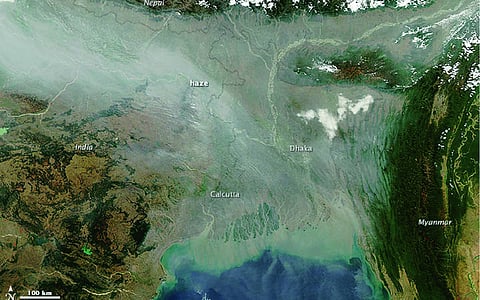The black carbon threat
Air pollution in the higher parts of the Hindu Kush Himalaya (HKH) region, which is accelerated by global warming, is a threat to the lives of 750 million people, says a new study.
The people living along the banks of Indus, Ganga and Brahmaputra rivers that are fed by glacier melt, face the immediate risk of flooding and water crisis in the event of a complete meltdown of the glaciers, according to a World Bank report.
HKH is tucked between the Indo-Gangetic region on the south and the Tibetan plateau on the north and northeast – two of the most polluted regions in the world, notes Glaciers of the Himalayas: Climate Change, Black Carbon, and Regional Resilience.
Melting glaciers and the loss of seasonal snow pose significant risks to the stability of water resources in South Asia. Their ice reserves feed into three major river basins in South Asia – the Indus, Ganges, and Brahmaputra – that are home to 750 million people.
A second driver maybe deposits of anthropogenic black carbon (BC), which increase the glaciers’ absorption of solar radiation and raise air temperatures. BC is generated by human activity both inside and outside of South Asia
Aerosols, especially black carbon, travel up from the surrounding areas in the form of smoke and settle in the higher altitudes. This film of pollutants skews the albedo (solar reflectance) of glaciers that is crucial for their survival. Thus, the structures end up absorbing more sunlight and the high terrains become hotter.
Anthropogenic black carbon deposits such as soot are further accelerating glaciers and snow melt in these mountain ranges.
Smog (smoke and fog) has become an occasional phenomenon across the Indo Gangetic plain.
It is reported that India and China are the biggest contributors of black carbon – the chief aerosol pollutant. The concentration of the particle will go up and its impact will be far-reaching, according to the World Bank study.
Accelerated glacier melting in the face of climate change is also expected to exacerbate various water-induced natural hazards, such as glacial lake outburst floods and general flooding, with subsequent impacts on people and assets at risk, according to the report.
Often called the ‘Third Pole’, the HKH region, with close to 55,000 glaciers, stores the most freshwater after the north and the south poles.
But in the last 50 years, at least 509 glaciers have reportedly disappeared and the rate at which glaciers are melting has doubled since 2005, according to glaciologists.

